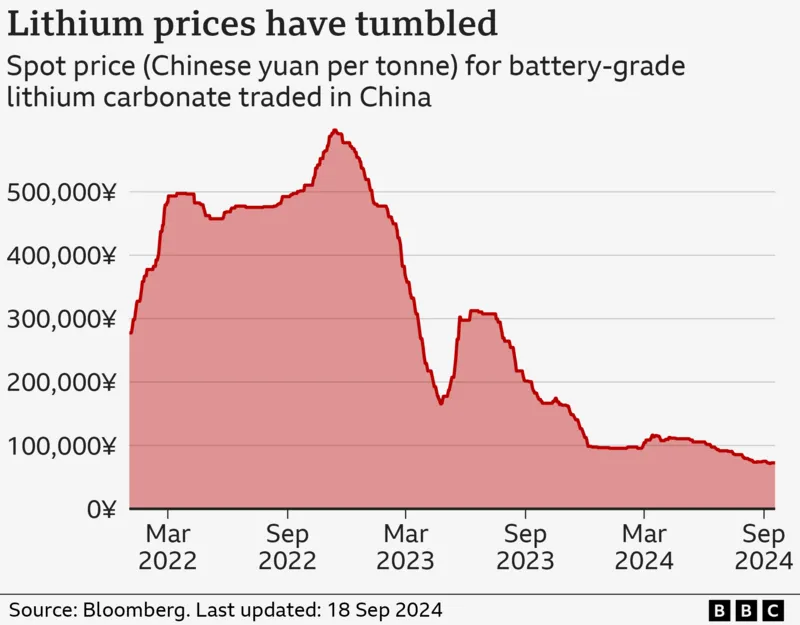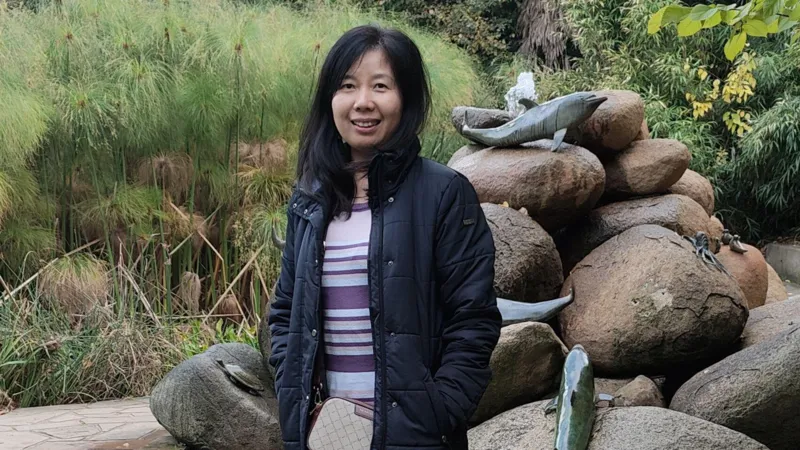Australia’s Lithium Mining
Often referred to as “white gold,” lithium is a vital component in rechargeable batteries and is so light that it can float on water. However, its price has drastically fallen over the past year.
This significant drop is largely due to declining electric vehicle sales and a global surplus of lithium ore. Since June 2023, the price of the main lithium compound has plummeted by over 75%.
Australia, the world’s largest lithium ore producer, has been particularly affected, representing 52% of the global total last year. The country also possesses the second-largest lithium reserves, primarily located in Western Australia and a smaller portion in the Northern Territory.
As prices have fallen, many mines have been forced to shut down. Core Lithium, based in Adelaide, announced in January that it would suspend operations at its Finniss site near Darwin due to “weak market conditions,” resulting in 150 job losses.
In August, US company Albemarle also indicated it would cut production at its Kemerton lithium processing plant, located around 170 km (100 miles) south of Perth, which is expected to lead to over 300 job cuts.

This month, Arcadium Lithium announced it would be closing its Mt Cattlin mine in Western Australia, citing low prices as the cause. The company’s shares are listed in both the US and Australia.
Despite some producers halting operations, others are confident about future demand and are expanding their production. Pilbara Minerals, based in Perth, plans to increase its lithium ore production by 50% over the next year.
Managing director Dale Henderson noted the historical volatility of lithium prices and expressed optimism about the long-term outlook, stating that they are not overly concerned about current market conditions.

Kingsley Jones, founder and chief investment officer at Jevons Global, reinforced this viewpoint, highlighting that lithium is crucial for the energy transition, particularly in the growing demand for storage batteries for renewable energy sources.
However, some analysts caution that the oversupply of lithium could keep prices under pressure until at least 2028, complicating the outlook for the industry.
Liontown Resources, another company in Australia, is advancing its lithium production efforts. In July, it began production at its Kathleen Valley mine, located 420 miles (680 km) northeast of Perth, with 60% of its energy sourced from its solar panel farm.
Read Also: Uber and Bolt Drivers Turn to a New Nigerian Fintech for More Control
Australia’s Minister for Climate Change and Energy praised the mine’s green energy approach, and the government has invested $230 million (approximately $156 million USD) in the project.
This shift toward renewable energy is beneficial for Australian producers, as it reduces their reliance on costly diesel, which is currently the primary fuel for electricity generation in lithium extraction.
Lithium extraction in Australia is energy-intensive, requiring three times more energy than in countries like Chile and Argentina. This is because Australian lithium ore, or spodumene, must be mined from solid rock, unlike the brine extraction methods used in South America.

Prof. Rick Valenta of the Sustainable Minerals Institute explained that hard-rock mining in Australia results in higher energy consumption and emissions compared to brine operations.
Almost all lithium exported from Australia, primarily in the form of spodumene concentrate, is sent to China for further processing. The price of spodumene has recently reached its lowest level since August 2021.
Chinese companies refine spodumene into solid lithium and the two main compounds used in batteries: lithium hydroxide and lithium carbonate. The price difference is substantial, with a tonne of lithium carbonate currently around 72,500 yuan ($10,280 USD) compared to just $747 ($630 USD) for the same weight of spodumene concentrate.
In response to this pricing discrepancy, Australian mining companies are beginning to develop their own lithium refineries instead of predominantly exporting spodumene. Last year, 98% of Australia’s lithium was exported as spodumene concentrate.
The first commercially produced refined lithium in Australia was announced in 2022 when IGO began making battery-grade lithium hydroxide at its Kwinana Refinery, co-owned with Chinese firm Tianqi Lithium.

Other Australian firms, such as Covalent Lithium, are also building their own lithium refineries, while Albemarle has a refinery that is currently reducing its output.
Some experts view the growth of lithium refining in Australia as a way to reduce China’s dominance in the global market, where it currently controls 60% of lithium refining activities.
Conversely, Kingsley Jones argues that Australia should be more receptive to Chinese investment in the lithium sector, as relations between the two countries have soured since 2020, affecting investment opportunities.
In light of these tensions, the Australian government has blocked certain investments, including a sale of an Australian lithium miner to a Chinese firm, following recommendations from the Foreign Investment Review Board.
Jones criticized this approach, stating that turning away the largest buyer could harm Australian producers in the long run.
Australia’s Department of Industry, Science and Resources did not respond to inquiries for comment.
As Australia aspires to enhance its lithium refining capabilities, researchers are investigating environmentally friendly methods of production. Current refining processes release harmful chlorine gas, prompting the search for cleaner alternatives.
Research scientist Dongmei Liu from the CSIRO explained the drawbacks of existing industrial methods and is working on a new process called “shock quenching,” which involves cooling lithium vapor to avoid harmful emissions.
In addition to improving refining methods, Australia aims to increase recycling efforts. Companies like Lithium Australia focus on processing end-of-life batteries to recover lithium and other metals for reuse.
Lithium Australia’s CEO Simon Linge stated that developing a circular battery industry is essential for ensuring Australia can produce and recycle its own batteries, reducing reliance on foreign sources.





